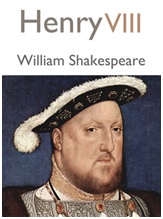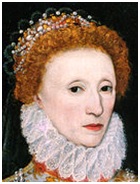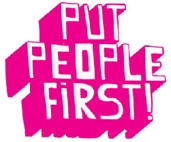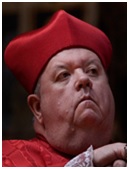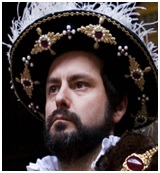|
 |
|
 |
Shakespeare's Henry VIII - Leadership and
Ethics
Henry VIII
Key characters Henry VIII, king of England (pictured right below) . Katherine of Aragon, his first wife, whom he divorces Cardinal Wolsey, his Lord Chancellor (chief minister) whom he fires for not getting the divorce. Duke of Buckingham, English aristocrat. Thomas Cranmer, Archbishop of Canterbury, who approves the divorce.
Fun facts
The story The Duke of Buckingham is arrested and sent to the Tower of London for denouncing Cardinal Wolsey’s dictatorial power. King Henry is unaware of a new tax which his wife, Queen Katherine, tells him is causing public unrest. Wolsey:
After Buckingham’s trial and execution, Henry wants to divorce Katherine, because she is his brother’s widow (and so, according to the Bible, their marriage is unlawful). Wolsey:
Henry:
The new Archbishop of Canterbury, Thomas Cranmer, has few friends because of his support for Henry’s divorce. The king:
Katherine forgives Wolsey after he had humbly admitted his wrongdoing in a speech just before his death. She is still fond of Henry, despite his bad treatment of her. Henry hears that Anne has given him a daughter (the future Elizabeth I, pictured right below). Cranmer baptizes her,
saying she will:
Lessons on leadership and ethics
1. Be sensitive to your people’s needs Henry gives Wolsey total power and so loses touch with ordinary people. It is Katherine who tells him about the injustice of Wolsey’s new tax. Henry also:
2. Principles are paramount The play’s heroes stand by their principles in the face of intense opposition.
Wolsey (Ian McNeice, pictured right, in a 2010 production) and Henry are less attractive characters, because of their:
Wolsey is a deceitful schemer who wants the divorce to create an alliance with France by marrying Henry to the French king’s sister. But, after his dismissal, Wolsey redeems himself by humbly admitting his wrongdoings. 3. Be loyal to your supporters Henry supports Cranmer by:
Henry (Dominic Rowan, star of British TV's Law and Order) is pictured right in the 2010 production
4. Family matters At Elizabeth’s baptism, Henry says that bringing her into this world is the best thing he has done. 5. Power corrupts Wolsey’s downfall is caused by his arrogant belief that he is:
6. Humility is vital Just before his death and after losing all his power and wealth, Wolsey realizes the importance of humility and honour, giving him
Key quote on communication Words are no deeds, Henry.
Key quote on careers Fling away ambition: by that sin fell the angels, Wolsey.
Key quote on love Love thyself last: cherish those hearts that hate thee, Wolsey.
Key quote on relationships Heat not a furnace for your foe so hot that it do singe yourself, Duke of Norfolk.
Key quote on peace of mind A peace above all earthly dignities, a still and quiet conscience, Wolsey.
Key quote on success To climb steep hills requires slow pace at first, Duke of Norfolk. |
|
|
||
|
|
|
||
|
||
| Copyright © wisdomtowin.com All Rights Reserved | ||
|


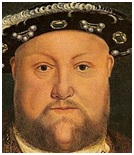
 spelt with a ‘k’ in the play) and marriage to Anne Boleyn (Anne Bullen
in the play).
spelt with a ‘k’ in the play) and marriage to Anne Boleyn (Anne Bullen
in the play).